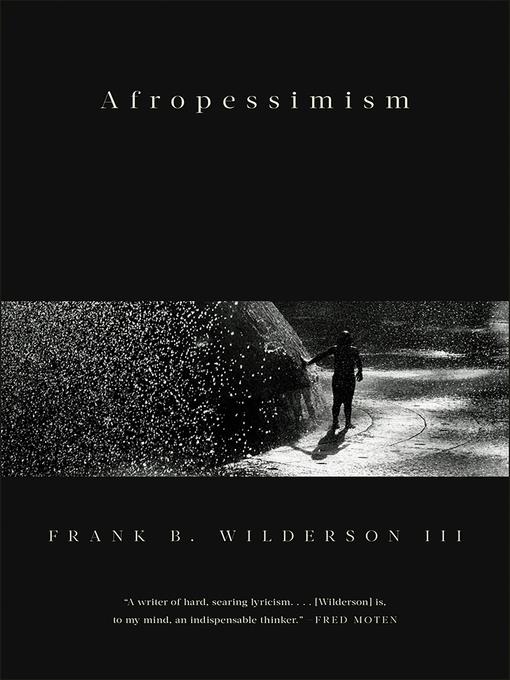
Afropessimism
کتاب های مرتبط
- اطلاعات
- نقد و بررسی
- دیدگاه کاربران
نقد و بررسی

January 20, 2020
Racism is a virulent, intractable feature of modern society, argues this vehement memoir-cum-manifesto. Wilderson (Incognegro), a professor of African-American studies at U.C.-Irvine, recollects his experiences of living while black through the lens of Afropessimism, a radical philosophy that, in his telling, views all relationships between blacks and other races—including Wilderson’s own mixed-race marriage—as forms of master-slave domination, and sees antiblack racism at the mystical core of all social ideologies. (“f Black people were recognized and incorporated as Human Beings,” he writes, “Humanity would cease to exist; because it would lose its conceptual coherence, having lost it baseline other.”) These ideas frame a loose-limbed memoir of racial antagonisms great (battling apartheid in South Africa in the 1990s), small (growing up amid microaggressions in Minneapolis) and mysterious. (He and a girlfriend fled their apartment believing that a white neighbor deliberately contaminated it with radioactive material.) Wilderson’s academic theorizing can be turgid and overwrought—“he very paradigm of electoral politics is predicated on sexualized violence against Black people”—but when he sticks to his personal experience of racial alienation, his writing is powerful, nuanced, and lyrical. (“Her hair was white and thin as dandelion puffs,” he recalls of a visit to his aged mother.) Wilderson’s passionate account of racism’s malevolent influence is engrossing, but not always convincing.

February 1, 2020
A compelling, profoundly unsettling blend of memoir and manifesto that proposes that--by design--matters will never improve for African Americans. To be black, writes Wilderson III, who chairs the African American Studies program at the University of California, Irvine, is not just likely to descend from slaves, but to be forever condemned to the existential condition of a slave. As he writes, "slavery did not end in 1865. It is a relational dynamic...[that] can continue to exist once the settler has left or ceded governmental power." No other ethnic group--not Native Americans, Asian Americans, Arab Americans, or Hispanic Americans--in the U.S. suffers the same institutional violence, and, Wilderson suggests, all others are more structurally aligned with the white oppressor than with the oppressed African American in a system that hinges on violence. Blending affecting memoir that touches on such matters as mental illness, alienation, exile, and a transcendent maternal love with brittle condemnation of a condition of unfreedom and relentless othering, the author delivers a difficult but necessary argument. It is difficult because it demands that readers of any ethnicity confront hard truths and also because it is densely written, with thickets of postmodern tropes to work through ("blackness is a locus of abjection to be instrumentalized on a whim...a disfigured and disfiguring phobic phenomenon"). The book is deeply pessimistic indeed, as Wilderson rejects any possibility of racial reconciliation in these two-steps-backward times. Perhaps the greatest value of the book is in its posing of questions that may seem rhetorical but in fact probe at interethnic conflicts that are hundreds, even thousands of years old. Wilderson advances a growing body of theory that must be reckoned with and that "has secured a mandate from Black people at their best; which is to say, a mandate to speak the analysis and rage that most Black people are free only to whisper." An essential contribution to any discussion of race and likely to be a standard text in cultural studies for years to come.
COPYRIGHT(2020) Kirkus Reviews, ALL RIGHTS RESERVED.

March 15, 2020
Wilderson, a professor and chair of African American Studies at University of California, Irvine, blends expressive accounts of his experiences from adolescence through middle age, a roller coaster of highs and lows, with an intellectually sophisticated exposition of his philosophy of life, race, and the world. He describes his development of a metatheory, which he calls afropessimism, and which he defines as a critical project that, by deploying Blackness as a lens of interpretation, interrogates the unspoken, assumptive logic of Marxism, postcolonialism, psychoanalysis, and feminism. The result is a highly charged combination of memoir, criticism, and reflection. On the personal side, Wilderson shares memories of Minneapolis, Berkeley, and South Africa, and candidly recounts his mental breakdown while in graduate school. On a larger scale, he charts the endless repercussions of slavery within Black lives. Looking to literature, film, and philosophy, he traces the profound impact of violent subjugation, the role of the enslaved in building nations, and how pervasive and profound the damage remains. A hard-hitting and mind-expanding introduction to a new way of viewing the past and the present.(Reprinted with permission of Booklist, copyright 2020, American Library Association.)

























دیدگاه کاربران